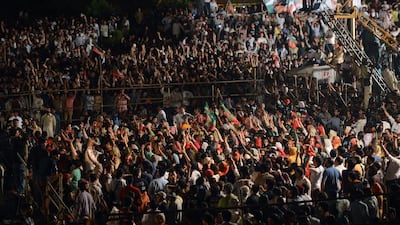In Pakistan, Imran Khan’s Long March and Tahir ul Qadri’s Azadi (Freedom) March have come and gone. There is no doubt that the government could and should have handled things better. There is also no doubt that its panic-stricken reactions encouraged both sets of marchers into believing they posed a greater threat than they actually did. But now, that is history.
They were given a free run. They marched and reached the capital. But their show of strength was poor. Mr Qadri had fewer numbers but his followers are diehard supporters. Mr Khan had greater numbers, though less than a tenth of the million he had promised. It soon became apparent to both leaders that their strength was insufficient to pose a real challenge to the government. Both reacted differently.
Mr Qadri, despite being a political nonentity, was the more astute. He came up with undeniable facts and figures and began to address real issues of governance. Admittedly, prime minister Nawaz Sharif inherited a destroyed economic system and had to spend billions to initiate a recovery. And yet, Mr Qadri's indictment was very stark and appalling. And it appealed to the people. He has taken up the common man's cause. Mr Khan, by comparison, seemed naive and rudderless.
Having started his protest ostensibly against rigging in the 2013 elections, he kept raising the bar. To start with, Mr Khan asked for an audit of four seats of the National Assembly (NA) and three of the Punjab provincial assembly. He later increased the number of NA seats to 10. Mr Khan continually asserted that he was not seeking midterm polls. Had the government agreed early enough to an audit, the wind would have been taken out of his sails. Emboldened by the government’s panicked reaction, he started seeking Mr Sharif’s resignation and midterm elections.
But the difference between the two is greater. Both succumbed to fatigue by the small hours of August 16. While Mr Qadri stayed in his luxurious trailer, Mr Khan decided to abandon his followers and went home to his palatial residence.
Not merely due to greater numbers, but also due to lack of administrative foresight, Mr Khan’s followers were left to fend for themselves, while Mr Qadri’s were attended to. Inevitably, Mr Khan’s group began deserting.
While letting both marches into Islamabad, the government set only one restriction: do not violate the Red Zone that houses parliament and diplomatic missions.
On Tuesday, Mr Khan exhorted his followers not to violate the Red Zone. In the same address, however, he warned the government that he should not be expected to be able to stop them from doing so, as they were an inexorable “tsunami”. I read this as deliberate licence to his followers. Fortunately, security forces were instructed not to retaliate.
Mr Khan’s desperation has been mounting. In his enthusiasm, he has adopted an inflexible position asking for Mr Sharif’s resignation and can see no way of getting there without a violent confrontation.
Consequently, while calling on the nation to respond to his call for “civil disobedience” on the one hand, he has also seemingly supported the provocative act of entering the Red Zone. If that leads to violence – which Mr Khan may expect and want – where will it end? In the interim, chaos is certain.
In calling for civil disobedience, Mr Khan is quoting the sterling examples of Mahatma Gandhi and Nelson Mandela – but without referring to the vast difference between the situations under which they took up this call, and that of Pakistan today.
What is worse is that Mr Khan has asked members of his Pakistan Tehreek-e-Insaaf (PTI) party to resign from their elected positions in the Central and Punjab provincial assemblies, but not from the Khyber Pakhtunkhwa (KP) province where his party leads the coalition government.
In other words, his party will enjoy the perks of the offices they hold in KP, by continuing to run the provincial government even as they refuse to pay their taxes and bills.
Mr Khan has been accused of many things, including naïveté and being politically simplistic. But even his detractors have hesitated to challenge his innate honesty. This latent hypocrisy in his public position has surprised and disappointed many.
In this entire farce, the Pakistan army again played its role from behind the scenes. Reliable sources hold the army responsible for the government’s decision to permit the marchers to enter Islamabad as well as warning the government against retaliating to PTI’s provocative violation of the Red Zone.
Finally, the army chief called on both sides to find a non-violent solution to this crisis yesterday. To me this sounds ominously close to a final warning to resolve your issues.
But neither Mr Khan nor Mr Qadri is prepared to negotiate and the government wants to resolve things constitutionally. If Mr Khan showed flexibility, Mr Qadri would probably follow suit. As it stands, both seem determined to force an issue.
The army would prefer not to enter the fray. But how far and how long can it continue to avert the disaster that Mr Khan seems determined to bring about?
Whichever way it goes, Mr Khan has played his last card and it seems likely that he has lost.
Brig Shaukat Qadir is a retired Pakistani infantry officer

